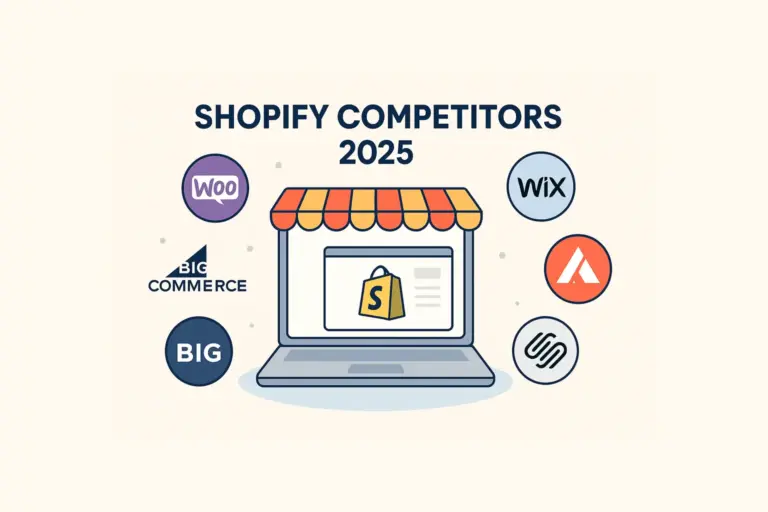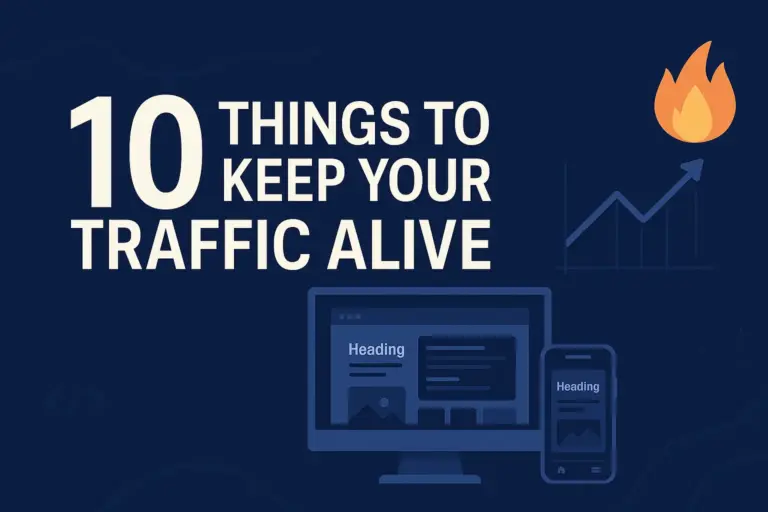AI for Small Business: ChatGPT‑5 & LLMs 2025 Survival Guide
AI for small business is no longer optional
AI for small business has moved from gimmick to daily infrastructure. Customers are already asking assistants to find, compare, and book—often without opening ten tabs.
A café owner dictates yesterday’s specials, and the assistant spins up a clean menu and a post before the kettle boils. A plumber speaks a short note; it turns into an invoice with photos, a thank‑you email, and a review request.
The businesses leaning into AI for small business aren’t waiting for perfect—they’re shipping helpful pages, quick replies, and tidy automations, then getting on with the work.
Here’s the hard truth we’ve learned building sites for real‑world businesses: a website isn’t a luxury; it’s survival. If you’re not online, you’re invisible—to people and to AI. When AI can’t read your offer, it recommends the competitor whose site is faster, clearer, and better structured.
What is AI for small business (and why now)
AI for small business means using modern LLMs (ChatGPT‑5 class) and automations to handle research, drafting, support, scheduling, quoting, and follow‑ups—without losing the human touch. The last two years changed five things:
1. Quality & reliability jumped. Models follow instructions, keep context, and ship business‑ready text, images, and code.
2. Multimodality is normal. Text, images, audio, documents; even live screen help.
3. Tool use & automations. Assistants call calendars, CRMs, spreadsheets, booking systems—chat turns into action. See 10 usecases how you can youse an AI chatbot on your website.
4. Costs down, speed up. What took a team now fits a smart workflow and a sane budget.
5. Search is AI‑first. People ask assistants; assistants read your site and answer on your behalf.
How AI for small business changes the customer journey
• Questions start in AI. “Who fixes roof leaks near me?” “Which package fits a 3‑bedroom reno?” “Who can build a fast site and connect my CRM?”
• Comparisons are instant. Assistants summarise reviews, prices, and guarantees. They surface evidence.
• Actions finish online. Booking, paying deposits, signing proposals—customers expect painless clicks.
Diana asks her phone for “same‑day roof leak fix, northern suburbs.” The assistant reads structured data from three local sites, checks service areas, spots one with same‑day slots on a visible calendar, and recommends it, including two fresh reviews and a price range. No glossy slogans—clear info wins.
Your website: the HQ of AI for small business
Your site is the source of truth for humans and machines. Social platforms are rented land; your website and first‑party data are assets you own. To win with AI for small business, make your site:
• Findable: clear messaging, clean page titles, helpful copy, and schema markup.
• Fast: Core Web Vitals in the green, compressed images, lean code.
• Credible: portfolio, testimonials with proof, case studies, guarantees, and pricing signals.
• Conversational: FAQs, comparison pages, calculators, and a helpful chat flow.
• Measurable: analytics, goals, call tracking, and event tags.
• Secure & compliant: HTTPS, backups, updates, privacy and accessibility.
Add structured data so assistants can trust and quote you. Keep content fresh so they keep returning.
Want this built properly? See our Custom WordPress development and AI & CRM integration. Or just book a free strategy call.
Minimum Viable AI‑Ready Website (MVAW)
Core
• Clear homepage value proposition (what, who, outcomes, location).
• Service pages with problems solved, process, timelines, pricing signals, FAQs.
• Mobile‑first contact/booking (form + phone + calendar).
• Fast performance: image compression, caching, CDN, no bloat.
• Schema: LocalBusiness, Service, FAQ, HowTo, Review where relevant.
• Blog/Resources that answer real questions (not fluff).
Trust
• Case studies with before/after visuals and metrics.
• Named testimonials (role + location).
• Clear policies: warranty, service areas, response times.
Data & measurement
• Privacy‑respecting analytics with goals.
• CTA tracking (forms, calls, bookings) and UTM discipline.
AI hooks
• Crawlable sitemap and robots.txt.
• FAQ/knowledge page written in plain language for LLMs.
• On‑site assistant grounded in your content (not generic chat).
Automation ROI: time saved = money saved
Automation is about stopping Tuesday‑you from doing Friday‑night admin. A few boring but essential wins:
• Lead triage → auto‑tag in CRM → instant reply with three smart questions → slot suggestion.
• Calendar → no back‑and‑forth; clients pick a time from live availability.
• Invoicing → job complete → invoice with line items/photos → polite reminders at 7 & 14 days.
• Email marketing → new lead gets a short nurture; past customer gets a 6‑month service reminder.
• Proposal prep → pre‑filled from price book; AI flags missing scope items.
• After‑hours voice chatbot → answers missed calls, captures details, books a slot, sends a summary.
Do the math. Save 4 hours/week = 208 hours/year. At $50/hour, that’s $10,400—like a part‑time admin! Save 2 hours/day × 5 days × 48 weeks = 480 hours; at $40/hour, that’s $19,200. Automation done right doesn’t forget attachments, mistype phone numbers, or skip Tuesday follow‑ups.
30/60/90‑day plan implementation AI for small business
Days 1–30: Stabilise & clarify
• Audit speed, SEO basics, conversion friction, broken links.
• Fix hosting, SSL, caching/optimisation, image pipeline.
• Clarify offers; publish minimum viable pages (services, FAQs, contact, about).
• Set up analytics and conversion tracking.
Days 31–60: Prove value & systematise
• Publish 4–8 helpful articles that include AI for small business where natural.
• Add 2–3 case studies with outcomes and photos.
• Launch a simple nurture: instant reply → 24‑hour follow‑up → 7‑day check‑in.
• Connect website → CRM → calendar; automate confirmations and reminders.
Days 61–90: Add smart assistance
• On‑site assistant grounded in your policies and content.
• Quoting helper or calculator for your most requested service.
• 90‑day editorial calendar based on search + customer questions.
• Review metrics; prune what doesn’t work; double down on winners.
Proven use cases of AI for small business
Trades & home services
• Photo intake → instant estimate window; service‑area checks; calendar bookings.
• After‑hours voice chatbot; post‑job review requests and warranty reminders.
Professional services (accounting, legal, consulting)
• Draft engagement letters; summarise calls; auto‑create tasks.
• Knowledge base for recurring questions; AI scheduling for first consults.
Retail & e‑commerce
• Product copy in your voice + alt‑text + schema.
• Smart FAQs and returns; email marketing sequences for restocks and cart recovery.
Education & training
• Personalised reminders and micro‑quizzes; onboarding flows.
• Certificates and progress emails automated from the LMS.
Hospitality
• Menu updates across site + Google Business Profile; event pages from a template.
• Reservations and waitlist automation with friendly follow‑ups.
Cross‑industry quick wins
• Lead enrichment from form data; proposal QA; content repurposing.
Pitfalls in AI (and how to avoid them)
• Hallucinations: ground AI in your facts; approve outbound messages.
• Privacy & compliance: collect only what you need; disclose clearly; secure data.
• Over‑automation: keep humans for judgment calls.
• Brand drift: lock tone of voice and examples; review quarterly.
• Dependency: own your content and data; avoid platforms with no export.
AI + CRM integration
AI technology for small businesses truly excels when integrated into your existing workflow. We seamlessly connect voice and chat assistants, email automation sequences, and automatic appointment scheduling directly within your CRM system. If you don’t yet have a CRM, just let us know — we’ll assist you in selecting the right platform, setting it up, and training your team for optimal use.
FAQ
What is AI for small business really changing?
Discovery, speed, and consistency: faster replies, cleaner pipelines, fewer mistakes.
Do I still need a website if I have social media?
Yes. Your site is the source of truth for customers and AI assistants.
How fast can AI automation pay off?
Saving 4 hours/week ≈ 208 hours/year—often equal to a part‑time admin.
Which tasks should I automate with AI first?
Lead triage, scheduling, invoicing, follow‑ups, and email sequences.
Can you connect AI to my CRM?
Yes. Chatbot for your website, voice chat, email, and scheduling integrated into your pipeline.
Final word
AI for small business isn’t about replacing people—it’s about replacing wasted time and guesswork. Those who learn to delegate repetitive work to thoughtful automations pull ahead, because every saved hour compounds into better service, faster delivery, and cleaner margins.
A website isn’t a luxury—it’s your survival kit. If you’re not online, you’re invisible.
Ready to move? Let’s build the site and automations that make AI for small business work for you. Book a free chat and we’ll map your next 90 days—what to fix first, what to automate, and what to publish.






